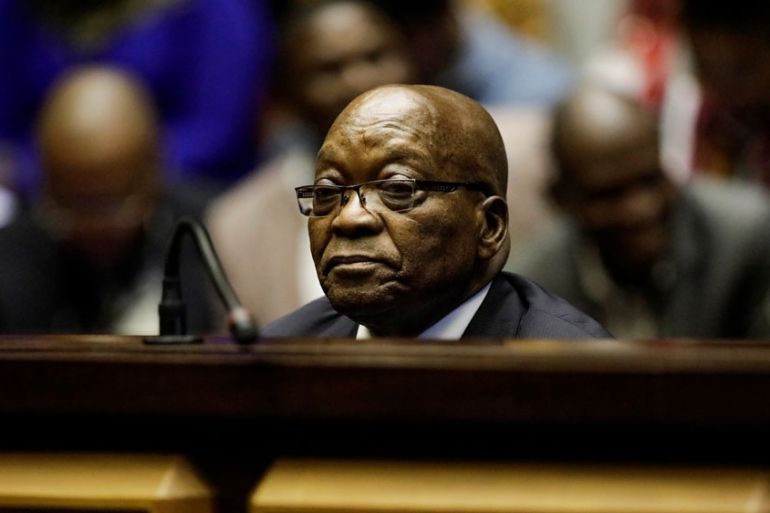S Africa: Zuma could face jail after corruption inquiry snub
Former South African President Jacob Zuma did not comply with a court order to appear before the panel probing corruption.

A South African inquiry into corruption during Jacob Zuma’s time as president will ask the Constitutional Court to impose a jail term on the former leader after he defied an order to appear before the inquiry on Monday.
Deputy Chief Justice Raymond Zondo, who leads the inquiry, said there was “no valid or sound reason” for Zuma’s failure to appear before the inquiry, which is probing allegations of high-level fraud during his period in power from 2009 to 2018.
Keep reading
list of 3 itemsProject Wave: Exposed media corruption scandalises South Africa
South Africa corruption inquiry to summon Zuma to testify
The 79-year-old denies wrongdoing but has not cooperated with the commission of inquiry. He was removed from office by the governing African National Congress (ANC) in 2018, in a move orchestrated by allies of his successor Cyril Ramaphosa.
“The commission will make an application to the Constitutional Court, which is the court that made the order that Mr Zuma has defied, and seek an order that Mr Zuma is guilty of contempt of court,” Zondo said.
He said it was up to the Constitutional Court – the highest in the land – to decide what to do about Zuma, with options including a fine or prison.
“The commission will approach the Constitutional Court and ask it to impose a term of imprisonment on Mr Zuma,” Zondo said, adding that everyone should be subjected to one legal system with no exceptions.
One of Zuma’s lawyers, Eric Mabuza, declined to comment when called by the news agency Reuters.

In a letter on Monday, Zuma’s lawyers said their client “would not be appearing before the commission” which had set aside February 15 to 19 for his testimony.
In the two-page “matter of courtesy” letter, Zuma’s lawyers concluded that his refusal to testify should not be “construed to suggest any defiance of a legal process”.
ANC divisions
Zuma’s refusal came a day after the ANC stressed the need for all its members to cooperate with the commission.
“To allow anything else would lead to anarchy and open the floodgates easily for counter-revolution,” the ANC said in a statement on Sunday.
Al Jazeera’s Fahmida Miller said Zuma’s refusal to appear before the court has highlighted the divisions within the party, with some members still loyal to the former president.
“We do know that the top six leadership of the ANC had planned to see the former president to compel him to appear at the commission, but this really is symbolic of the divisions within the party and its fight against corruption,” she said, speaking from Johannesburg.
Miller also said Zuma’s no-show has only proved critics of the commission right.
“It really does play into the hands of critics of the commission [who say] it doesn’t have much power and that it has to resort to the court to find any ruling of consequence,” she said.
State plunder
Ramaphosa has been trying to clean up the ANC’s image and restore investor confidence in Africa’s most industrialised nation since Zuma’s departure. However, he has faced opposition from an ANC faction still loyal to Zuma.
The allegations against Zuma include that he allowed businessmen close to him – three brothers Atul, Ajay and Rajesh Gupta – to plunder state resources and influence policy.
The Guptas, who deny wrongdoing, left South Africa after Zuma was removed from power. Zuma walked out of the inquiry in November without permission. Its officials then approached the Constitutional Court to make him reappear and testify.
A lawyer for the inquiry, Paul Pretorius, said Zuma had been implicated by the evidence of at least 40 witnesses.
“Mr Zuma, perhaps more than anyone else is able to assist the commission in understanding what happened in the period under review,” Pretorius said.
“It’s difficult to understand why he would need to rely on a right to silence.”
Speaking near Zuma’s Nkandla homestead in southern Kwa-Zulu Natal province, Edward Zuma, one of his sons, told reporters there had been a longstanding conspiracy against his father and the inquiry had treated him differently to other witnesses.
Meanwhile, local media showed images of dozens of people, some wearing military regalia and ANC party gear, staging a vigil in support of Zuma outside his rural homestead.
The group chanted and performed the “toyi-toyi” dance, a protest move synonymous with the struggle against apartheid.